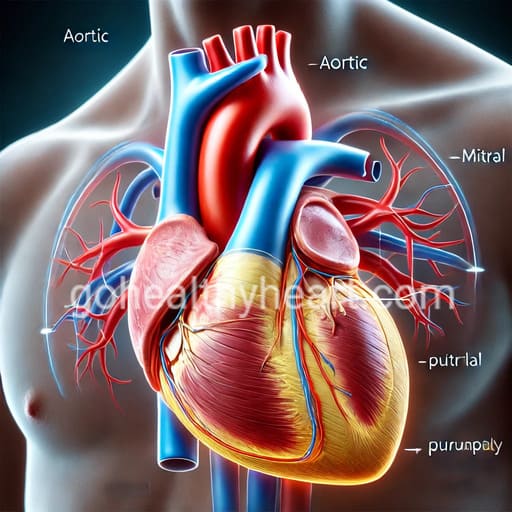Foods Causing Heart Palpitations You Must Avoid!

Introduction
Heart palpitations can be alarming when they occur, creating uncomfortable sensations of your heart racing, fluttering, or pounding in your chest. Understanding the foods causing heart palpitations can help you gain control over these unsettling episodes. While many cases are harmless and temporary, they can significantly impact your quality of life and sometimes signal underlying health concerns.
Diet plays a crucial role in managing heart health and palpitations. What we eat and drink can directly influence our heart rhythm, making dietary choices an important aspect of managing these episodes.
Understanding which foods causing heart palpitations is essential for making informed decisions about your diet. Identifying the foods causing heart palpitations can help you better manage your symptoms. These dietary triggers vary among individuals, but several common culprits have been identified through research and clinical observation.
Common Trigger Foods
Caffeine
Caffeine is perhaps the most well-known substance that can trigger heart palpitations. This stimulant increases adrenaline production and blocks adenosine, a chemical that promotes sleep.
These effects can cause your heart to beat faster and raise your blood pressure, potentially triggering palpitations. Even small amounts of caffeine may cause reactions in sensitive individuals.
Common sources of caffeine include:
- Coffee and espresso-based drinks
- Tea (particularly black and green varieties)
- Chocolate (especially dark chocolate)
- Energy drinks and some sodas
- Some over-the-counter medications
Alcohol
Alcohol consumption can disrupt normal heart rhythm in several significant ways. It directly stimulates the heart to beat faster or irregularly while acting as a diuretic, causing dehydration.
These effects, combined with alcohol’s ability to disrupt electrolyte balance and blood sugar levels, create ideal conditions for heart palpitations. Regular or excessive alcohol consumption often leads to more frequent episodes.
For those already experiencing heart rhythm issues, even moderate drinking may exacerbate symptoms. The relationship between alcohol and foods causing heart palpitations is well-established in cardiovascular research.
Spicy Foods
Spicy foods containing compounds like capsaicin can affect heart function through multiple mechanisms. They stimulate the sympathetic nervous system, which can increase heart rate and cause blood vessels to dilate.
Additionally, spicy foods may trigger acid reflux or GERD symptoms, which can mimic or exacerbate palpitations. While many people tolerate spicy cuisine without issues, those with sensitive cardiovascular systems may notice increased palpitations after consuming spicy meals.
Common spicy ingredients that may trigger palpitations include:
- Hot peppers (jalapeños, habaneros, cayenne)
- Hot sauces and spicy condiments
- Curry powders and pastes
- Spicy ethnic cuisines (certain Mexican, Indian, Thai dishes)
High-Sugar Foods
Foods high in refined sugars and carbohydrates are significant contributors to heart palpitations. These foods cause rapid spikes and subsequent drops in blood sugar levels, which can trigger the release of stress hormones.
The resulting hormonal cascade can directly affect heart rhythm and rate. Blood sugar fluctuations are particularly problematic for individuals with conditions like hypoglycemia or diabetes.
Common high-sugar foods causing heart palpitations include:
- Candy and chocolate
- Pastries, cakes, and cookies
- Sugary cereals and granola bars
- Sweetened beverages and fruit juices
- Ice cream and frozen desserts
Processed Foods
Highly processed foods often contain ingredients that contribute to palpitations through multiple pathways. Their high sodium content can increase blood pressure and fluid retention, putting additional stress on the heart.
Many processed foods also contain trans fats, chemical preservatives, and hidden sugars that negatively impact heart health. The combination of these elements creates perfect conditions for triggering heart palpitations.
Examples of processed foods to monitor include:
- Fast food and fried items
- Packaged snacks and chips
- Processed meats (bacon, sausage, deli meats)
- Ready-made meals and frozen dinners
- Canned soups and sauces with high sodium
Fatty Foods
Foods high in unhealthy fats can contribute to heart palpitations through several mechanisms. They require more extended digestion time, which increases cardiac workload during the digestive process.
Over time, fatty foods contribute to atherosclerosis and reduced blood flow. They can also cause temporary inflammation that affects heart rhythm and lead to weight gain, which is associated with increased palpitations.
Common high-fat foods to be mindful of include:
- Fried foods and fast food
- Fatty cuts of meat
- Full-fat dairy products
- Foods containing trans fats
- Butter, lard, and certain cooking oils
Other Dietary Considerations
Food Additives
Certain common food additives have been linked to heart palpitations in sensitive individuals. These substances can trigger inflammatory responses or neurological reactions that indirectly affect heart rhythm.
Many people don’t realize these additives are among the foods causing heart palpitations. Identifying sensitivity to these substances often requires careful attention to ingredient labels and meal timing.
Common additives associated with palpitations include:
- Monosodium glutamate (MSG)
- Artificial sweeteners (aspartame, sucralose, saccharin)
- Sulfites (in wines, dried fruits, and preserved foods)
- Food dyes and colorings
- Preservatives like nitrates and nitrites
Individual Sensitivities
Food triggers can vary significantly between individuals based on genetic predisposition and existing health conditions. What causes palpitations in one person may have no effect on another.
Age, overall health, medication interactions, stress levels, and sleep quality all influence how your body responds to potential trigger foods. This variability highlights the importance of personal observation and tracking your responses to different foods.
Keeping a food diary can help identify your specific triggers among the foods causing heart palpitations. Track not only what you eat but also the timing, portion size, and any symptoms that follow.
Managing Heart Palpitations Through Diet
Heart-Healthy Alternatives
Incorporating heart-healthy foods can help reduce the frequency and severity of palpitations. These foods support proper electrical signaling in the heart and overall cardiovascular function.
Potassium-rich foods help maintain proper heart rhythm, while magnesium supports electrical signaling in the heart. Together, these nutrients work to counteract the effects of foods causing heart palpitations.
Beneficial foods to include in your diet:
- Potassium-rich foods (bananas, avocados, sweet potatoes, leafy greens)
- Magnesium sources (spinach, nuts, seeds, whole grains)
- Omega-3 fatty acids (fatty fish, flaxseeds, walnuts)
- Antioxidant-rich foods (berries, vegetables, herbs)
- Fiber-rich foods (legumes, whole grains, fruits)
Hydration Importance
Proper hydration is crucial for preventing palpitations related to dietary triggers. Water helps maintain blood volume and pressure while supporting proper electrolyte balance.
Even mild dehydration can trigger palpitations in susceptible individuals, especially when combined with trigger foods. Aim for at least 8-10 cups of water daily, adjusting for activity level, climate, and individual needs.
Hydration tips to prevent palpitations:
- Drink water consistently throughout the day
- Limit caffeine and alcohol consumption
- Consider electrolyte beverages during intense activity
- Monitor urine color (pale yellow indicates good hydration)
- Increase intake during hot weather or illness
Balanced Meal Structure
How you structure your meals can significantly impact the likelihood of experiencing palpitations. Eating smaller, more frequent meals prevents overloading the digestive system and avoids dramatic shifts in blood sugar.
Balancing carbohydrates with proteins and healthy fats helps stabilize blood sugar and metabolism. This approach can help neutralize the effects of occasional consumption of foods causing heart palpitations.
Effective meal planning strategies include:
- Eating smaller, more frequent meals
- Balancing carbohydrates with proteins and healthy fats
- Avoiding very large meals, especially before bedtime
- Maintaining regular meal timing
- Eating mindfully and slowly
Specific Dietary Approaches
The DASH Diet
The Dietary Approaches to Stop Hypertension (DASH) diet has shown benefits for heart health and may help reduce palpitations. This eating plan emphasizes fruits, vegetables, whole grains, and lean proteins while limiting sodium, added sugars, and unhealthy fats.
Following the DASH diet naturally reduces exposure to many foods causing heart palpitations. Studies show this approach not only helps with blood pressure but may also improve overall heart rhythm and function.
Key components of the DASH diet include:
- 4-5 servings each of fruits and vegetables daily
- 6-8 servings of whole grains
- 2-3 servings of low-fat dairy
- Limited intake of red meat, sweets, and added sugars
- Reduced sodium consumption
Mediterranean Diet Principles
The Mediterranean diet has long been associated with improved heart health and may help manage palpitations. This eating pattern emphasizes plant foods, healthy fats, and moderate protein consumption.
Many components of the Mediterranean diet directly counter the effects of foods causing heart palpitations. The anti-inflammatory nature of this diet supports normal heart rhythm and function.
Core elements of the Mediterranean diet include:
- Abundant fruits, vegetables, and legumes
- Whole grains and nuts
- Olive oil as the primary fat source
- Moderate consumption of fish and seafood
- Limited red meat and processed foods
Elimination and Reintroduction
For those struggling to identify specific trigger foods, an elimination diet may be helpful. This approach involves temporarily removing common trigger foods and then systematically reintroducing them while monitoring symptoms.
This method can be particularly effective for identifying personal sensitivity to foods causing heart palpitations. It’s best done under healthcare provider guidance, especially for those with existing medical conditions.
Steps for an elimination approach:
- Remove common trigger foods for 2-4 weeks
- Note any improvement in symptoms
- Reintroduce one food category at a time
- Monitor and document any reactions
- Create a personalized avoidance list based on results
When to Seek Medical Help
While managing foods causing heart palpitations can help reduce episodes, certain situations warrant medical attention. Persistent or severe palpitations, especially when accompanied by other symptoms, should never be ignored.
Heart palpitations can sometimes signal underlying conditions that require treatment beyond dietary changes. Always prioritize professional medical advice when dealing with heart-related symptoms.
Seek immediate medical attention if palpitations occur with:
- Chest pain or pressure
- Shortness of breath
- Dizziness or fainting
- Unusual fatigue
- Swelling in the legs or ankles
Practical Tips for Daily Management
Reading Food Labels
Becoming proficient at reading food labels is essential for identifying hidden sources of foods causing heart palpitations. Look beyond marketing claims and focus on the ingredient list and nutritional information.
Pay special attention to caffeine content, sodium levels, added sugars, and preservatives. These elements are often present in foods causing heart palpitations but may be listed under various technical names.
Tips for effective label reading:
- Check serving sizes (manufacturers sometimes use small serving sizes to make numbers look better)
- Look for hidden sources of caffeine and stimulants
- Be aware of sugar’s many names (corn syrup, dextrose, maltose, etc.)
- Check sodium content, especially in packaged foods
- Be cautious of “natural flavors” which can hide problematic ingredients
Dining Out Strategies
Eating at restaurants presents challenges for those managing heart palpitations through diet. Limited information about ingredients and preparation methods can make it difficult to avoid trigger foods.
With some preparation and assertive communication, you can still enjoy dining out while minimizing exposure to foods causing heart palpitations. Most restaurants are willing to accommodate reasonable requests.
Strategies for safer dining experiences:
- Research menu options online beforehand
- Ask about ingredients and preparation methods
- Request modifications (no MSG, less salt, etc.)
- Choose simpler dishes with fewer ingredients
- Consider eating a small snack before going out to avoid hunger-driven poor choices
Gradual Transitions
Making dietary changes gradually often leads to better long-term compliance than dramatic overhauls. Start by reducing rather than eliminating trigger foods, especially those you enjoy most.
Focus first on the foods causing heart palpitations that most consistently affect you. As your body adjusts to these changes, you can progressively modify other aspects of your diet as needed.
Approach for sustainable dietary changes:
- Start with the most problematic trigger foods
- Substitute alternatives rather than simply eliminating favorites
- Experiment with herbs and spices to enhance flavor without triggers
- Keep track of improvements to stay motivated
- Celebrate small victories along the way
Conclusion
The relationship between diet and heart palpitations is complex and often highly individualized. By understanding common trigger foods and making thoughtful dietary choices, many people can significantly reduce the frequency and severity of their palpitations.
If you experience heart palpitations regularly, consider keeping a food diary to identify potential triggers specific to your body. While dietary changes can be effective, remember that persistent or severe palpitations warrant medical attention.
By combining awareness of foods causing heart palpitations with appropriate medical care, most individuals can effectively manage these episodes. Learning to identify and avoid the foods causing heart palpitations is a powerful step toward better heart health. This integrated approach improves overall cardiac health and quality of life while addressing both symptoms and underlying causes.
Frequently Asked Questions
Heart palpitations are sensations of a racing, fluttering, or pounding heartbeat. They can occur during rest or physical activity and are often harmless, but they can be alarming.
If you notice that coffee triggers your palpitations, it may be best to limit or avoid it. However, some individuals can tolerate moderate amounts without issues. It’s important to listen to your body.
Yes, several foods causing heart palpitations include those high in caffeine, alcohol, sugar, and unhealthy fats. It’s advisable to monitor your diet and identify which foods causing heart palpitations affect you personally.
In addition to dietary changes, consider practicing relaxation techniques such as yoga or meditation, staying hydrated, and incorporating heart-healthy foods rich in potassium and magnesium.
If you experience frequent or severe palpitations, especially accompanied by symptoms like chest pain, shortness of breath, or dizziness, it’s important to consult a healthcare professional for evaluation.
Yes, stress and anxiety can trigger heart palpitations. Managing stress through relaxation techniques and lifestyle changes can help reduce their occurrence.
Spicy foods may trigger palpitations in some individuals due to their stimulating effects or potential for causing acid reflux. If you notice a correlation, consider reducing your intake.
Certain supplements like magnesium, omega-3 fatty acids, and coenzyme Q10 may support heart health. However, consult with a healthcare provider before starting any new supplements.



